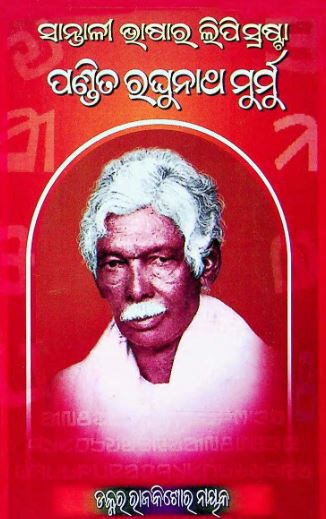In the vibrant tapestry of Odisha’s cultural heritage, the contributions of indigenous communities often remain underappreciated. One such luminary who played a pivotal role in preserving and promoting the Santali language is Pandit Raghunath Murmu. His life and work, encapsulated in the biography “Santali Bhasar Lipi Srasta” by Rajakisor Naik, published in 2017 and re-released in 2023, delve deep into the essence of tribal identity and the significance of the Olchiki script.
Born in the heart of Odisha, Raghunath Murmu emerged from the Santhal community—a tribe known for its rich cultural traditions and art forms. His early life was steeped in the oral traditions of his people, where storytelling and the oral transmission of knowledge were paramount. This formative environment instilled in him a strong sense of identity and a desire to preserve his language.
Raghunath Murmu’s most notable achievement is the creation of the Olchiki script in the 1920s, a writing system specifically designed for the Santali language. Prior to his innovation, the oral tradition of the Santali people meant that their rich linguistic heritage was vulnerable to erosion. The Olchiki script transformed this narrative, allowing for the documentation of Santali folklore, songs, and literature. In a world increasingly filled with homogeneity, his contribution helped sustain the uniqueness of the Santali language.
Rajakisor Naik’s biography is more than just a recounting of Murmu’s life; it is a tribute to the ethos of tribal resilience and cultural pride. The book contextualizes Murmu’s work within the broader spectrum of Odisha’s socio-political landscape, shedding light on the struggles faced by tribal communities in asserting their identity amidst modernization and globalization.
Detailed and comprehensive, the biography explores the obstacles Murmu faced while advocating for the Santali language. Despite the challenges of limited resources and societal indifference, his determination ultimately led to the widespread acceptance of the Olchiki script among Santali speakers. Naik, with his profound understanding of tribal issues, effectively conveys not just Murmu’s accomplishments, but also the vital role that language plays in the formation of cultural identity.
The Olchiki script is not merely a tool for writing; it embodies the spirit of the Santali people. By establishing a formalized script, Murmu paved the way for literacy and education within tribal communities. This has had far-reaching implications, particularly in fostering a sense of belonging and pride among young Santals today.
In this era of rapid cultural exchange and technological advancement, Naik emphasizes that Murmu’s work is a clarion call to acknowledge and preserve indigenous languages. “Santali Bhasar Lipi Srasta” serves as a reminder that cultural heritage should not just be safeguarded but celebrated.
The biography “Santali Bhasar Lipi Srasta” by Rajakisor Naik thus stands as a poignant homage to Pandit Raghunath Murmu—an exceptional figure in Odisha’s history and a champion of tribal rights. His life’s work continues to inspire a new generation of Santali speakers who are equipped to carry forward their linguistic and cultural legacy. Through its pages, readers embark on a journey that intertwines language, identity, and the ceaseless human spirit—an essential read for anyone interested in the vibrant tapestry of India’s tribal heritages.
Books Info
| Books name | Kalahandi O Indradebata/କଳାହାଣ୍ଡି ଓ ଇନ୍ଦ୍ରଦେବତା |
| Author | Rajakisor Naik |
| No Of pages | 112 |
| Publisher | Orissa Sahitya Academy |
| Publication | 2017, 2023, 2e. |
| Printed At | Orissa Printing Works |
| Distributor | NA |

